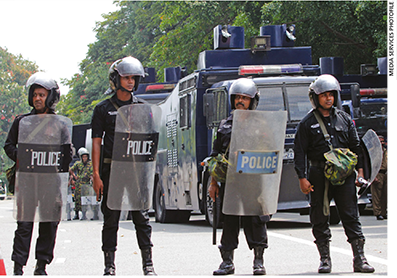THE CONSTITUTIONAL CRISIS
SRI LANKA MUSTN’T LOSE FAITH
Dr. Jehan Perera feels the time is right for a fresh power sharing regime
The outcome of the cataclysmic changes that took root on Friday 26 October is uncertain at the time of writing. It can make Sri Lanka a more mature and united democracy or take us down the road to hell that many other third world countries have gone.
On that fateful Friday, President Maithripala Sirisena took unexpected action against his main coalition partner in the national unity government.
Even as the shades of twilight fell, he had without prior notice withdrawn his party from the government coalition and installed his one-time nemesis ex-president Mahinda Rajapaksa as the new prime minister. The incumbent Ranil Wickremesinghe was on his way to Colombo from Galle when notice was sent to him.
The president’s action in sacking the PM and dissolving the coalition government without notice set the stage for a descent into turmoil. Large foreign funded development projects were put on hold, foreign capital invested in the stock market fled the country, the slide in the value of the rupee continued apace and paralysis of government departments continued as the public service wondered which master to serve.
What’s more, the situation can deteriorate still further. The scenes of violence in parliament on 15 November were an indication of the potential for violence in society at large.
A political deadlock that makes parliament unworkable poses dangers for democracy itself. It can force a mass mobilisation of political parties as has been seen on multiple occasions at the Liberty roundabout, parliament grounds and Lipton’s Circus. Although the security forces didn’t have to overtly intervene as demonstrators on both sides were peaceful, this situation cannot be taken for granted. It only needs a small group of provocateurs to set in motion acts of violence that can have a cascading effect.
Despite the portents being ominous, the odds are that this resilient country like no other will pull back from the brink. Despite severe pressure being put on them, the main organs of government have stood firm against the power of the executive.
The legislative branch of government did not succumb to the blandishments of money and positions, and the crossovers from one side of the political divide to the other were too few to alter the majority in parliament. When called upon to judge between the merits of the cases presented by the executive and legislature, the judiciary performed its role without fear or favour.
Underlying the arguments put forward by supporters of the president’s actions is the notion that the sovereignty of the people is uppermost in a democracy. Accordingly, what the majority want is what the government should stand for and do. The thesis that they put forward is that the people want a change of government and that was seen at the local government elections held in February in which the parties of the coalition fared poorly.
According to them, the sovereignty of the people justifies the drastic actions that the president took by sacking the prime minister and then dissolving parliament. The sovereignty of the people is undoubtedly an important aspect of democracy – but democracy is also more than doing what the majority at a certain point in time want.
What is at stake in this political power struggle is the adherence to the constitution as the foundational law and rule of law, which civilises the use of power and reins it in. These laws are not, as the president seems to have been misadvised, mere guidelines for action.
So far, the transition of power from one government to another in Sri Lanka has taken place peacefully and according to the law of the land. Even in the case of the infamous referendum of 1981, which prolonged the life of parliament, there was adherence to the law though not to its spirit.
The interim order of the Supreme Court stayed the president’s action of dissolving parliament in the present case. If the rules of the game aren’t followed this time, the violations can be worse next time around.
We must not lose faith.
If the constitution is adhered to and rule of law followed, Sri Lanka will emerge from this unprecedented crisis as a stronger, more mature and more united polity. With the onset of the political crisis, there has been an unprecedented unity of civil society, and ethnic and ideological minority political parties, working hand in hand with the mainstream polity.
The political stage is being set for a fresh general election with a lawful caretaker government rather than one that has barged in and taken control. The time is ripe for a new power sharing government that has learnt from the mistakes of the recent past.





